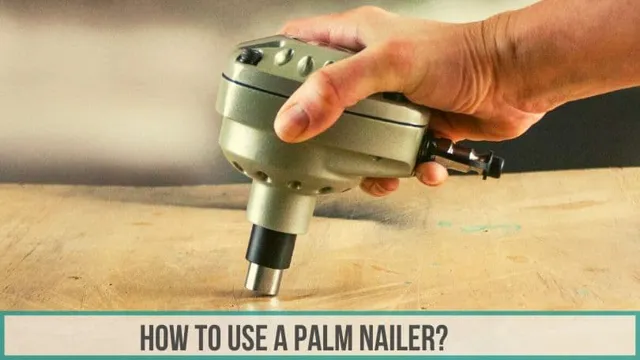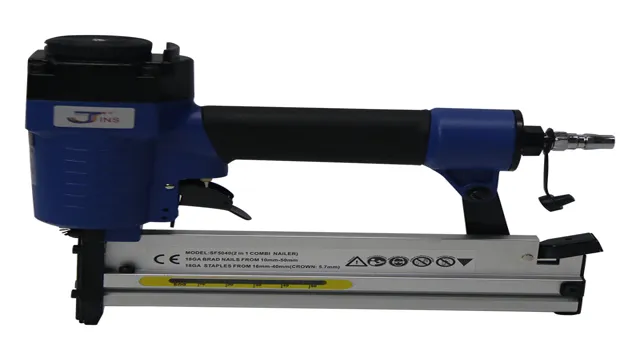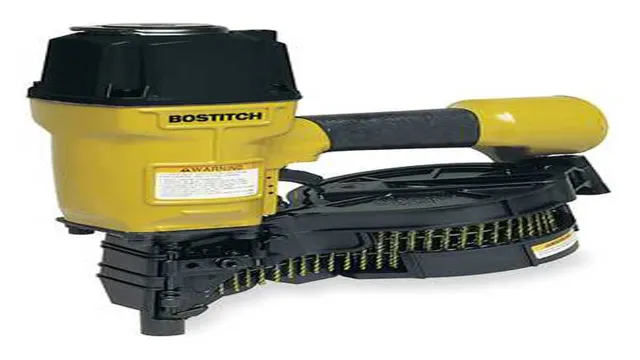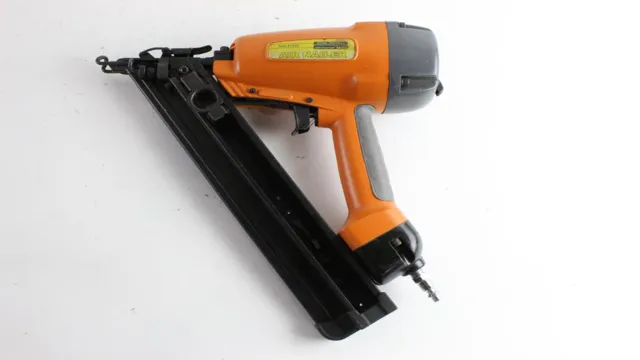What Air Nailer Do I Need for DIY Projects? A Comprehensive Guide
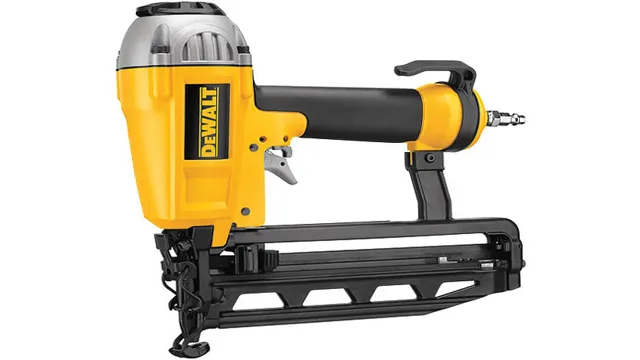
Looking to get yourself an air nailer to take on your DIY projects? But confused about which air nailer you need? With the plethora of air nailers available in the market, it’s natural to be baffled. After all, choosing the right air nailer is crucial for your project’s success. Whether you’re a seasoned professional or a weekend DIY enthusiast, picking the right air nailer can make all the difference.
From framing nailers to finish nailers, there are different types of air nailers designed for specific tasks. So, how do you narrow down on the best one for your needs? Let’s dive into understanding the different types of air nailers and their uses, which will help you make an informed decision.
Types of Air Nailers
When it comes to choosing the right air nailer for your project, there are several types to consider. The most common ones are framing, finish, brad, and pin nailers. Framing nailers are used for heavy-duty construction projects, while finish nailers are perfect for delicate and precise work, like trimming and molding.
Brad nailers are great for smaller projects like attaching trim, while pin nailers are perfect for detailed work like creating picture frames. However, it’s important to consider the type of nails that your air nailer can hold, as different sizes have varying uses. Ultimately, choosing the right air nailer depends on the specific project you have in mind and the type of nails you will be using.
So, the next time you question what air nailer you need, consider the requirements of your project and the type of nails needed. Proper research on air nailers can ensure you have a professional and efficient outcome.
Brad Nailers (<2 inches)
Brad nailers that are less than 2 inches in length are a type of air nailer that are ideal for precise and intricate nail work. These nailers are also known as finish nailers and are designed specifically for lighter projects such as trim work, baseboards, molding, and cabinetry. They are also used for attaching thin pieces of wood together without splitting them.
Brad nailers use thin gauge nails that have small heads, which allow for minimal damage to the surface being nailed. The nails are loaded into a magazine on the nailer and are propelled by compressed air, ensuring a secure hold on the material. These nailers are an affordable and efficient option that are perfect for DIY projects and professional carpentry work alike.
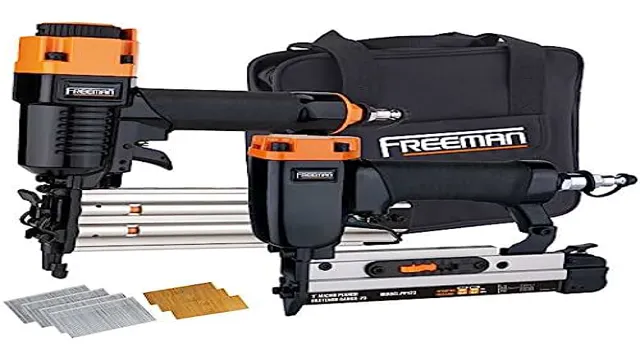
Finish Nailers (1.5-2.5 inches)
Finish nailers, also known as brad nailers, are a type of air nailer that is perfect for precision woodworking tasks. These nailers typically use nails that are between 5-
5 inches in length, and they are designed to leave a small, almost invisible hole in the wood. This makes them perfect for use in finishing work where appearance is important. Finish nailers come in two main types: angled and straight.
Angled finish nailers are great for tight spaces and hard-to-reach areas, while straight finish nailers are perfect for traditional woodworking tasks. Whichever type of finish nailer you choose, you can be sure that it will make your woodworking tasks easier, faster, and more precise. So, whether you are a DIY enthusiast or a professional woodworker, adding a finish nailer to your toolbox is a great investment.
Framing Nailers (2-3.5 inches)
When it comes to types of air nailers, framing nailers are a popular choice for many construction workers and DIY enthusiasts. These nailers can accommodate nails ranging from 2 to 5 inches in length, making them perfect for framing walls, roofs, and floors.
There are two main types of framing nailers: clipped-head and round-head. Clipped-head framing nailers have a triangular shape that allows them to hold more nails per clip, while round-head framing nailers have a circular shape that complies with building codes in some states. Regardless of the type you choose, a framing nailer can save you time and effort on your next construction or renovation project.
With its ability to drive nails quickly and accurately, you’ll be able to complete your tasks in a fraction of the time it would take with a traditional hammer and nails. So, if you’re looking to improve your efficiency and productivity on the job site or at home, consider investing in a framing nailer.
Roofing Nailers (1-1.75 inches)
Roofing nailers are a type of air nailer that is designed to handle nails between 1 and 75 inches in length. They are commonly used in the construction industry for roofing installations and repairs.
These nailers come in two different types: coil and strip. Coil nailers hold long strings of nails that are wire-welded together, while strip nailers hold a series of nails that are connected by a paper or plastic strip. Both types of nailers are effective at attaching roofing materials to the roof deck, but the coil nailer is preferred for larger jobs due to its high capacity and decreased need for reloading.
Roofing nailers also come with various features such as depth adjustment and anti-jam features, which make the job easier and more efficient. Regardless of the type of roofing nailer you choose, it’s important to use it safely and to follow manufacturer instructions to ensure proper use.
Considerations When Choosing
When it comes to selecting the right air nailer for your needs, there are a few considerations to keep in mind. First, think about the types of projects you’ll be working on. For example, if you’re tackling larger outdoor projects like fencing or decking, you may want to opt for a heavier-duty framing nailer.
On the other hand, if you’re working on smaller projects like trim work or finishing work, a brad nailer may be a better fit. Additionally, consider the size and weight of the nailer, as well as the type of nails it uses. Depending on your level of experience and comfort with power tools, you may prefer a more lightweight option that’s easier to handle.
Ultimately, when pondering what air nailer do I need, take into account the unique demands of your specific projects to make the best choice.
Type of Project
When it comes to choosing a type of project, there are many factors to consider. One of the most important is the scope of the project. Are you looking for a small project that can be completed quickly, or a larger project that will require more time and resources? Another important consideration is the level of complexity involved in the project.
Do you have the skills and knowledge to complete the project, or will you need to hire outside help? Finally, it is important to consider your budget and timeline. Can you afford the resources needed to complete the project on time and within budget? By taking these factors into account, you can choose the right type of project for your needs and ensure its success.
Size of Nails Needed
When it comes to choosing the right size of nails for your project, there are a few things to consider. The first consideration is the thickness of the material you are nailing into. If the material is thin, such as with trim or molding, you will want to use a smaller nail to avoid splitting the wood.
On the other hand, if the material is thick or dense, such as with a decking board or fence post, you will need a longer and thicker nail to ensure a secure hold. Another consideration is the function of the nail. Are you looking for a finishing nail that will be mostly hidden, or a framing nail that will be exposed? This will affect the size and type of nail you choose.
It’s important to not only choose the right size of nail, but also the right type, such as galvanized or stainless steel, to ensure long-lasting durability. By taking these factors into account, you can choose the perfect size of nail for your project and ensure a successful outcome.
Compressor Compatibility
When it comes to choosing a compressor, compatibility should be a top consideration. It’s important to ensure that the compressor you choose is compatible with the tools and equipment you’ll be using. This means considering factors like pressure, flow rate, and power requirements.
It’s also important to think about the environment in which the compressor will be used. Will it be operating in a dusty or dirty environment? Will it be exposed to extreme temperatures? These factors can impact the compressor’s performance and longevity, so it’s important to choose one that’s built to handle the conditions it will be subjected to. Ultimately, taking the time to carefully consider compatibility can help ensure that you choose a compressor that meets your specific needs and delivers reliable performance over the long term.
Ease of Use and Comfort
When it comes to choosing a product for everyday use, ease of use and comfort should be at the forefront of your mind. After all, if a product is too complicated to use or uncomfortable to wear, then it defeats the purpose of having it in the first place. When considering ease of use, think about how intuitive the product is in terms of its design and controls.
Ideally, you want a product that is easy to operate without needing a manual. As for comfort, look for features such as ergonomic designs, breathable materials, and adjustable straps that can make all the difference in terms of how comfortable a product is to wear. Ultimately, choosing a product that is both easy to use and comfortable will make your daily life much more pleasant and enjoyable.
Top Air Nailers in the Market
When it comes to choosing the right air nailer, it all depends on the type of project you have in mind. If you’re doing light framing, a finish nailer would be ideal. For outdoor projects like decking and fencing, it is recommended that you get a brad nailer.
If you’re working on an upholstery project, a staple gun would be your best bet. And for heavy-duty projects like roofing or framing, a framing nailer would be the perfect fit. Remember to consider the size of nails, air pressure, and magazine capacity.
Choosing the right air nailer can make your job easier and more efficient, so be sure to do your research and find the one that meets your needs.
Brad Nailer: DEWALT DWFP12231
If you’re in the market for a reliable and versatile air nailer, the DEWALT DWFP12231 Brad Nailer is a top contender. With its lightweight and compact design coupled with its impressive power and precision, this air nailer is bursting with features that appeal to DIY enthusiasts and professional contractors alike. Its tool-free depth-of-drive adjustment allows for quick and easy adjustments to nail depth without needing any special tools, making it highly convenient for job sites.
Additionally, the DWFP12231 has a rear exhaust to help keep things dust-free and is oil-free, which means less maintenance and upkeep. The DEWALT Brad Nailer is easy to use and helps you achieve professional-level results every time, making it a popular pick for those in the market for an air nailer.
Finish Nailer: Bostitch N62FNK-2
When it comes to air nailers, there are plenty of options on the market. But if you’re in need of a reliable finish nailer, the Bostitch N62FNK-2 should be on your radar. This tool is a favorite among professionals and DIY enthusiasts alike for its superior performance and durability.
Its compact size allows for easy maneuvering, especially in tight spaces. Plus, it’s fully customizable with adjustable depth control, making it a versatile tool for finishing work on a range of materials. And with its oil-free operation, you can rest easy knowing there won’t be any messy clean-up involved.
Trust us, the Bostitch N62FNK-2 is definitely a worthy investment for anyone in need of a top-performing finish nailer.
Framing Nailer: Hitachi NR90AES1
If you’re in the market for an air nailer, you might be overwhelmed by all the options out there. Which one is the best? Well, let me introduce you to the Hitachi NR90AES1 – a framing nailer that is certainly worth considering. This top of the line machine is extremely durable and designed to handle heavy-duty work, making it perfect for professional use.
But, it’s also easy to use and great for beginners too. The Hitachi NR90AES1 operates at 70-120 psi with a magazine capacity of 64-70 nails, making it reliable and efficient. One of the best features of this air nailer is its depth adjustment, which allows for precision and control over the depth of each nail.
If you’re looking for a high-quality framing nailer that can handle a variety of jobs, look no further than the Hitachi NR90AES
Roofing Nailer: Freeman PCN450
Looking for the best air nailer in the market for roofing jobs? Look no further than the Freeman PCN450. This top-rated roofing nailer packs a punch with its heavy-duty construction and powerful motor, making it the perfect tool for professional roofers. Featuring a lightweight and ergonomic design, the Freeman PCN450 allows for easy maneuverability and less fatigue, ensuring that you can work longer without feeling tired or uncomfortable.
Additionally, its adjustable depth control allows for precise nail placement, preventing overdriving or underdriving of nails. So say goodbye to shaky hands and uneven nails and hello to a superior roofing job with the Freeman PCN450 roofing nailer!
Conclusion
After all is said and done, the answer to “what air nailer do I need?” is simply this: the one that gets the job done! But, if you want to get a little more specific, you’ll want to consider the type of project you’ll be tackling, the materials you’ll be working with, and the size of the nails you’ll need. With those factors in mind, you’re well on your way to selecting the perfect air nailer for your DIY projects or professional carpentry needs. Just remember, the right tool is only part of the equation – don’t forget to prioritize safety and proper technique as well!”
FAQs
What is an air nailer?
An air nailer is a tool used to drive nails into various materials using compressed air.
What are the different types of air nailers available in the market?
There are several types of air nailers available, including framing nailers, finish nailers, brad nailers, roofing nailers, and flooring nailers.
What is the difference between a framing nailer and a finish nailer?
A framing nailer is used to drive nails into wood framing, while a finish nailer is used for finer, more delicate work, such as crown molding or baseboards.
Can I use a finish nailer for framing?
No, it is not recommended to use a finish nailer for framing because it is not powerful enough and may damage the wood.
What size air compressor do I need for my air nailer?
The size of the air compressor needed depends on the type of air nailer being used. For example, a framing nailer requires a larger compressor than a finish nailer.
Is a cordless nailer better than an air nailer?
It depends on the application and personal preference. Cordless nailers are more portable and convenient, but they may not be as powerful as air nailers.
What safety measures should I take when using an air nailer?
Always wear eye and ear protection, keep your hands and fingers away from the nailer’s muzzle, and ensure that the nailer is securely loaded and disconnected from the air supply when not in use.

